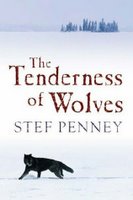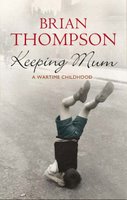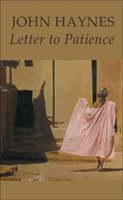 Got an e-mail from someone in the publicity department of Simon & Schuster a week or two back asking me if I'd "take another look" at Stef Penney's The Tenderness of Wolves on my blog since the book has just been launched in the US. It quite amazed me that my blog, tapped in on a keyboard in Malaysia, might help to shift some copies on the other side of the world.
Got an e-mail from someone in the publicity department of Simon & Schuster a week or two back asking me if I'd "take another look" at Stef Penney's The Tenderness of Wolves on my blog since the book has just been launched in the US. It quite amazed me that my blog, tapped in on a keyboard in Malaysia, might help to shift some copies on the other side of the world.Well, the book was sitting on my TBR shelf already, looking forlorn, so what was I to do?
As it turned out, this book was just the read I needed: a rattling good yarn I could slip into my bag and read in odd moments between visiting my student-teachers in schools.
You'll probably remember that the novel won this year's Costa First Novel Award, and although it's set in Canada, the author suffered so badly from agoraphobia that she was unable to travel there and instead did her research in the British Library.
Not that that matters. I remember Kunal Basu at the Ubud Readers' and Writers' festival last year talking about writing his historical novels. It was impossible for him to visit the places where he set his novels because they no longer exist. He saw this in a positive light:
What excites is inaccessibility in real terms, but accessibility in the imagination.Stef Penney sets her novel in mid C19th Canada and chucks in a whole load of ingredients ... murder, mysterious disappearances, codes to be cracked (one which may hold the secret of an ancient written Native American language and the other a fortune in furs), love stories (gay and straight).
If the story has a weakness it is that I think the author tried to cram in too much, and in parts, especially where the backgrounds of various characters were fleshed out, it seemed terribly rushed. There were an awful lot of threads to bring together by the end of the book, and whilst Penney largely managed this, some parts were left hanging.
I was sad that we did not have a chance to see the protagonist Mrs. Ross (what is her first name??) reunited with her adopted 17 year old son Francis after she finally (and how could she really miss all the clues?) realises that he is gay and that the murdered man was his lover.
And why was she in an asylum in Scotland ... and what does that have to do with the main drift of the story?
And why was there so little about the wolves?
The cast of characters is also very large - and some came alive rather more than others. Francis intrigued me. I liked the warm-hearted but bumbling accountant, Donald Moody, still trying to find his feet with the Hudson Bay Company.
But I loved the huge and ugly half-Mohawk, half-English trapper William Parker, and was so glad that Mrs Ross ended up warming her frostbitten fingers in his armpits ... even if I'd have liked something a lot steamier to melt the frozen Tundra.
Some characters didn't rise very far of the page though, including Knox and his wife and daughters. Others were well drawn but didn't have enough of a role in the book in my opinion, e.g. Jacob and Sturrock.
I also felt that the narration worked best in Mrs. Ross' first person, and got annoyed with the godlike omniscience with which the other chapters were narrated.
But as I say, a very good read which I'd recommend as I think many of you will enjoy it.
And I wouldn't be surprised to see it makes New York Times bestseller list.






